Related Research Articles
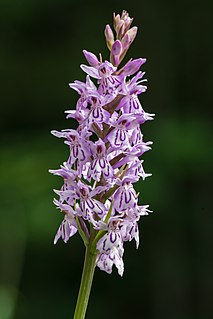
Dactylorhiza is a genus of flowering plants in the orchid family Orchidaceae. Its species are commonly called marsh orchids or spotted orchids,Dactylorhiza were previously classified under Orchis which has two round tubers.

Dolichovespula maculata is a species of wasp in the genus Dolichovespula and a member of the eusocial, cosmopolitan family Vespidae. It is known by many colloquial names, primarily bald-faced hornet, but also including bald-faced aerial yellowjacket, bald-faced wasp, bald hornet, white-faced hornet, blackjacket, white-tailed hornet, spruce wasp, and bull wasp. Technically a species of yellowjacket wasp, it is not one of the true hornets, which are in the genus Vespa. Colonies contain 400 to 700 workers, the largest recorded colony size in its genus, Dolichovespula. It builds a characteristic large hanging paper nest up to 58 cm (23 in) in length. Workers aggressively defend their nest by repeatedly stinging invaders.

Corallorhiza maculata, or spotted coralroot, is a North American coralroot orchid. It has three varieties: C. maculata var. occidentalis, C. maculata var. maculata, and C. maculata var. mexicana. It is widespread through Mexico, Guatemala, Canada, St. Pierre & Miquelon, and much of the western and northern United States. It grows mostly in montane woodlands.
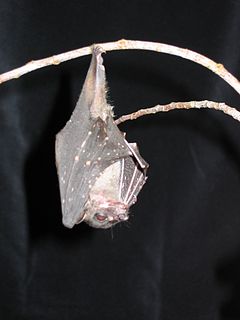
The spotted-winged fruit bat, is the smallest megabat in the world, and the only species in the genus Balionycteris. It inhabits forests in Indonesia and Malaysia.

The spotted houndshark, Triakis maculata, is a houndshark of the family Triakidae found in tropical waters in the eastern Pacific Ocean off the coast of South America. It usually grows to a length around 180 centimetres (71 in). The reproduction of this houndshark is ovoviviparous, with a litter of 14 pups being found in one female with a birth size of 30 to 40 centimetres. Their diet is believed to consist mainly of crustaceans.
The Wych Elm cultivar Ulmus glabra 'Maculata' was listed as Ulmus scabra maculata in the 1831-1832 catalogue from the Audibert brothers' nursery at Tonelle, near Tarascon in France.
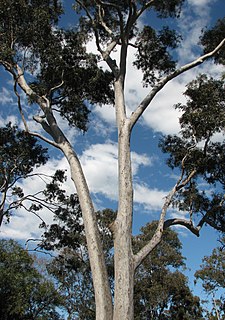
Corymbia maculata, commonly known as spotted gum, is a species of medium-sized to tall tree that is endemic to eastern Australia. It has smooth, mottled bark, lance-shaped to curved adult leaves, flower buds usually in groups of three, white flowers and urn-shaped or barrel-shaped fruit.
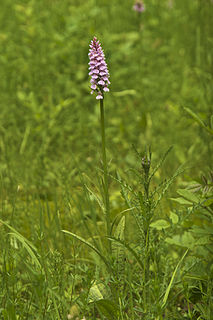
Dactylorhiza maculata, known as the heath spotted-orchid or moorland spotted orchid, is an herbaceous perennial plant of the family Orchidaceae. It is widespread in mountainous regions across much of Europe from Portugal and Iceland east to Russia. It is also found in Algeria, Morocco, and western Siberia.

Lysiosquillina maculata, the zebra mantis shrimp, striped mantis shrimp or razor mantis, is a species of mantis shrimp found across the Indo-Pacific region from East Africa to the Galápagos and Hawaiian Islands. At a length up to 40 cm, L. maculata is the largest mantis shrimp in the world. L. maculata may be distinguished from its congener L. sulcata by the greater number of teeth on the last segment of its raptorial claw, and by the colouration of the uropodal endopod, the distal half of which is dark in L. maculata but not in L. sulcata. A small artisanal fishery exists for this species.
Alfred Philpott was a New Zealand museum curator, entomologist and writer. He was born in Tysoe, Warwickshire, England, on 15 December 1870. He became the first person to describe Zelleria maculata in 1930.
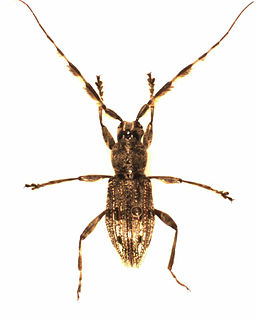
Parmenini is a tribe of longhorn beetles of the subfamily Lamiinae.
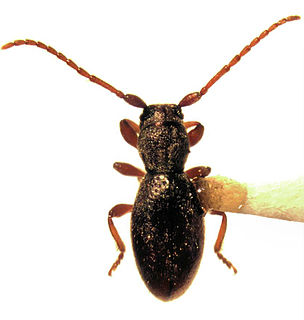
Somatidia is a genus of longhorn beetles of the subfamily Lamiinae, containing the following species:
Somatidia nodularia is a species of beetle in the family Cerambycidae. It was described by Broun in 1913.
Somatidia spinicollis is a species of beetle in the family Cerambycidae. It was described by Broun in 1893.
Somatidia latula is a species of beetle in the family Cerambycidae. It was described by Broun in 1893. It contains the varietas Somatidia latula var. obesula.
Somatidia nitida is a species of beetle in the family Cerambycidae. It was described by Broun in 1880. It contains the varietas Somatidia nitida var. variegata.
Somatidia terrestris is a species of beetle in the family Cerambycidae. It was described by Broun in 1880. It contains the varietas Somatidia terrestris var. fuscata.
Somatidia kaszabi is a species of beetle in the family Cerambycidae. It was described by Stephan von Breuning in 1975.
Somatidia ptinoides is a species of beetle in the family Cerambycidae. It was described by Henry Walter Bates in 1874.
Somatidia helmsi is a species of beetle in the family Cerambycidae. It was described by David Sharp in 1882.
References
- ↑ BioLib.cz - Somatidia maculata. Retrieved on 8 September 2014.